Having a gas power generator at home provides peace of mind during unexpected power outages and ensures continuous access to essential electrical appliances. Whether you live in an area prone to natural disasters or simply want to be prepared for emergencies, a gas generator can be your reliable backup power source. Let me walk you through the main aspects of home gas generators and help you understand why they might be a valuable addition to your household.
Spis treści:
Sample Power Consumption and Generator Sizing
Before deciding on a generator, you need to understand your power requirements. A typical household might need to power essential appliances like a refrigerator (700W), lighting (400W), heating system (500W), and perhaps a computer or TV (300W). This adds up to approximately 2000W of basic needs. However, when appliances start up, they often require more power – sometimes 2-3 times their running wattage. Therefore, for basic household coverage, you might want to consider a generator rated at 3000-4000W to account for these power surges.
Emergency Preparedness Benefits
A gas generator serves as your insurance against power failures. During severe weather conditions, natural disasters, or grid failures, you can maintain essential services like heating, refrigeration, and communication devices. This becomes particularly crucial if you have medical equipment that requires constant power, work from home, or need to keep your security systems operational. Having a generator also helps preserve perishable food during extended outages and maintains your family’s comfort and safety.
Cost Considerations
While the initial investment in a gas generator might seem significant, ranging from $500 to $2000 for residential models, consider it against potential losses during power outages. Factor in installation costs if you plan for a permanent setup, maintenance expenses, and fuel consumption. Gas generators typically use 8-22 gallons of fuel per day when running continuously, depending on the load. However, these costs are often justified when compared to lost work time, spoiled food, or hotel stays during extended power outages.
Maintenance and Safety
Proper maintenance ensures your generator’s reliability when you need it most. Schedule regular oil changes, filter replacements, and test runs every few months. Always operate the generator outdoors in a well-ventilated area, at least 20 feet from doors and windows, to prevent carbon monoxide poisoning. Store fuel safely in approved containers and maintain fresh fuel supplies. I recommend installing carbon monoxide detectors in your home and following the manufacturer’s maintenance schedule strictly to ensure safe operation.
Environmental Considerations
Modern gas generators are designed with improved fuel efficiency and reduced emissions compared to older models. However, they still produce carbon emissions and noise pollution. Consider using the generator only when necessary and choosing a model that meets current EPA emissions standards. Some newer models feature eco-throttle systems that adjust engine speed to match power demand, reducing fuel consumption and environmental impact while extending engine life.
